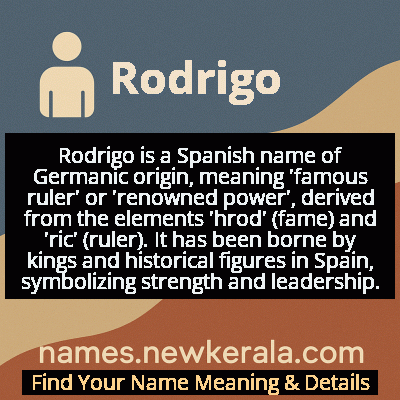Rodrigo Name Meaning & Details
Origin, Popularity, Numerology Analysis & Name Meaning of Rodrigo
Discover the origin, meaning, and cultural significance of the name RODRIGO. Delve into its historical roots and explore the lasting impact it has had on communities and traditions.
Name
Rodrigo
Gender
Male
Origin
Spanish
Lucky Number
5
Meaning of the Name - Rodrigo
Rodrigo is a Spanish name of Germanic origin, meaning 'famous ruler' or 'renowned power', derived from the elements 'hrod' (fame) and 'ric' (ruler). It has been borne by kings and historical figures in Spain, symbolizing strength and leadership.
Rodrigo - Complete Numerology Analysis
Your Numerology Number
Based on Pythagorean Numerology System
Ruling Planet
Mercury
Positive Nature
Adventurous, dynamic, curious, and social.
Negative Traits
Restless, impatient, inconsistent, prone to indulgence.
Lucky Colours
Green, white.
Lucky Days
Wednesday.
Lucky Stones
Emerald.
Harmony Numbers
1, 3, 9.
Best Suited Professions
Sales, marketing, travel, entertainment.
What People Like About You
Versatility, charisma, adventurous spirit.
Famous People Named Rodrigo
Rodrigo Díaz de Vivar
Military leader
Legendary Castilian knight known as El Cid, national hero of Spain
Rodrigo Borgia
Religious leader
Pope Alexander VI, influential Renaissance pope
Rodrigo Duterte
Politician
16th President of the Philippines
Rodrigo Santoro
Actor
Internationally recognized Brazilian actor
Name Variations & International Equivalents
Click on blue names to explore their detailed meanings. Gray names with will be available soon.
Cultural & Historical Significance
The name carries echoes of Spain's Reconquista period and the complex interplay of Christian, Muslim, and Jewish cultures that shaped the Iberian Peninsula. In Latin America, Rodrigo became popular during colonization and remains a classic choice that connects modern families to their Spanish heritage while embodying strength and tradition. The name's cultural weight extends beyond historical figures to represent the enduring values of leadership, family honor, and cultural identity that are central to Hispanic societies worldwide.
Extended Personality Analysis
Individuals named Rodrigo are often perceived as natural leaders with strong, charismatic personalities. They typically exhibit confidence, determination, and a commanding presence that draws others to them. Research in nominative determinism suggests that people with historically powerful names often develop leadership qualities, and Rodrigo is no exception. Many Rodrigos display ambition, strategic thinking, and the ability to inspire others, traits that align with the name's meaning of 'famous ruler.'
Beyond their leadership qualities, Rodrigos often possess a complex blend of strength and sensitivity. They tend to be protective of those they care about and value loyalty highly, while also demonstrating creativity and emotional depth. This combination makes them compelling figures who can excel in both creative and leadership roles. Their personality often reflects the historical Rodrigo figures who balanced military prowess with cultural sophistication, creating individuals who are both formidable and culturally aware. The name seems to inspire a sense of responsibility and the desire to leave a meaningful legacy.
Modern Usage & Popularity
Rodrigo remains a popular and timeless choice in Spanish and Portuguese-speaking countries, consistently ranking in the top 100 names in Spain, Mexico, Brazil, and Argentina. The name has maintained steady popularity without becoming overly trendy, making it a classic that transcends generations. In recent years, Rodrigo has gained international recognition through celebrities like Brazilian actor Rodrigo Santoro and Spanish filmmaker Rodrigo Cortés. The name's usage has spread beyond Hispanic communities, appearing in various European countries and among English speakers who appreciate its strong, melodic quality. Modern parents often choose Rodrigo for its blend of traditional roots and contemporary appeal, as well as its association with strength and leadership. The name's popularity has been reinforced by successful athletes, artists, and public figures who bear the name, ensuring its continued relevance in the 21st century while maintaining its cultural authenticity.
Symbolic & Spiritual Meanings
Symbolically, Rodrigo represents leadership, heritage, and cultural continuity. The name carries the weight of history, connecting bearers to centuries of Spanish and Portuguese tradition while embodying the ideal of the noble ruler. Metaphorically, Rodrigo suggests a bridge between past and present, honoring ancestral roots while embracing modern values. The name symbolizes strength with purpose—not just physical or political power, but the moral authority to lead and protect. In literary and cultural contexts, Rodrigo often represents the archetypal hero who must balance personal ambition with social responsibility. The name also carries connotations of romance and passion, reflecting the fiery spirit often associated with Hispanic culture. Symbolically, Rodrigo embodies the journey from potential to actualization, mirroring El Cid's transformation from exiled knight to legendary leader. This makes the name particularly meaningful for parents who wish to instill values of courage, integrity, and cultural pride in their children.

